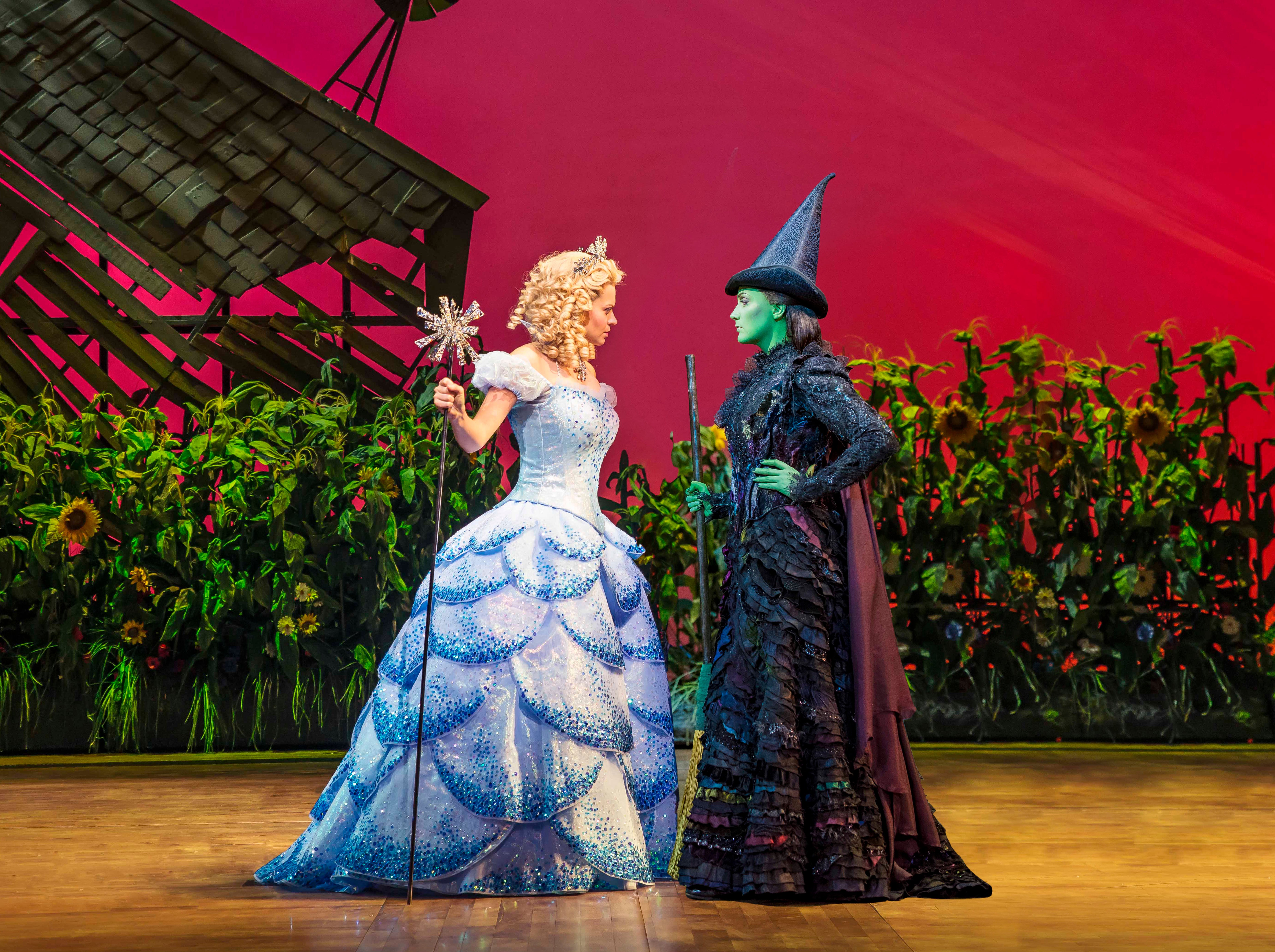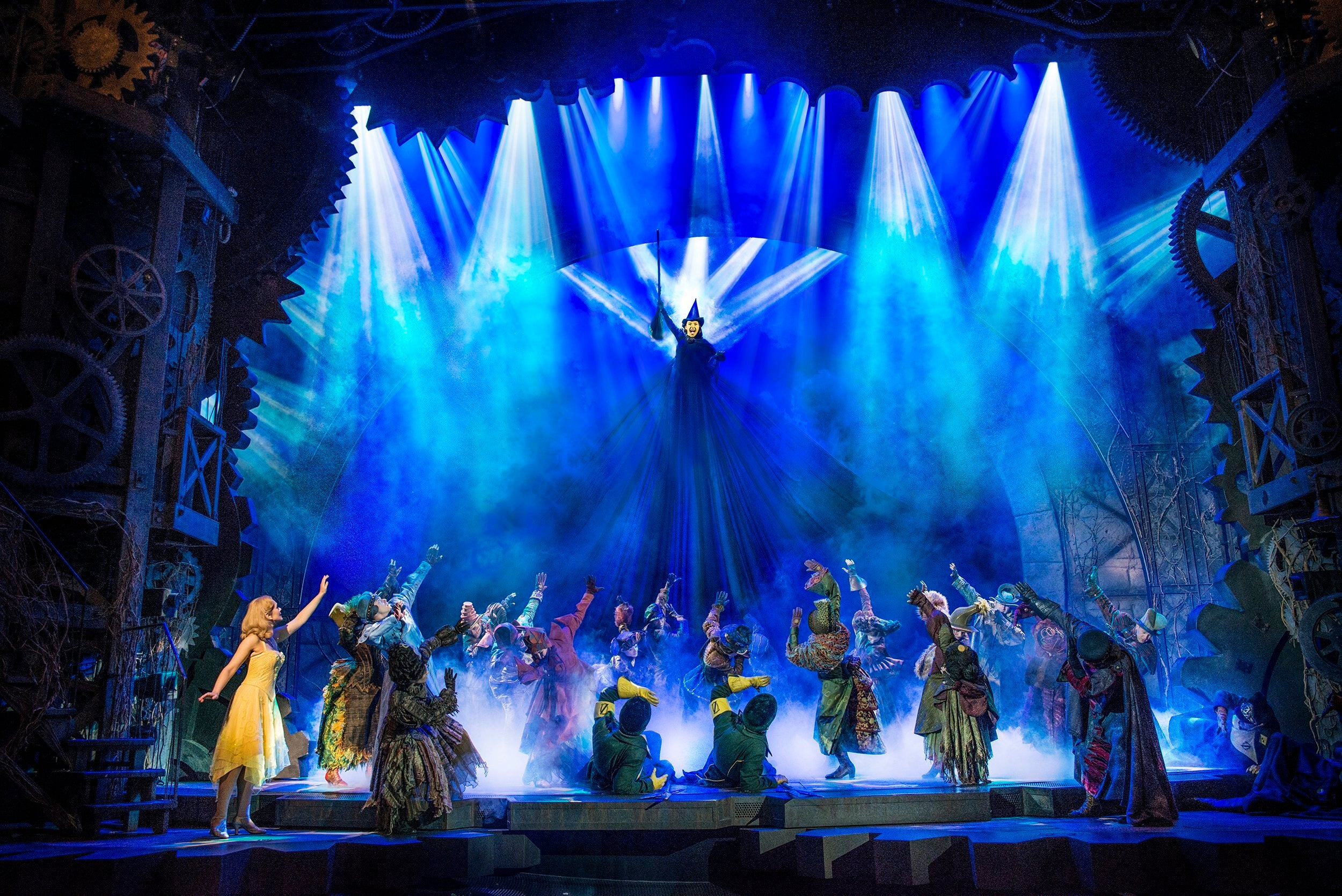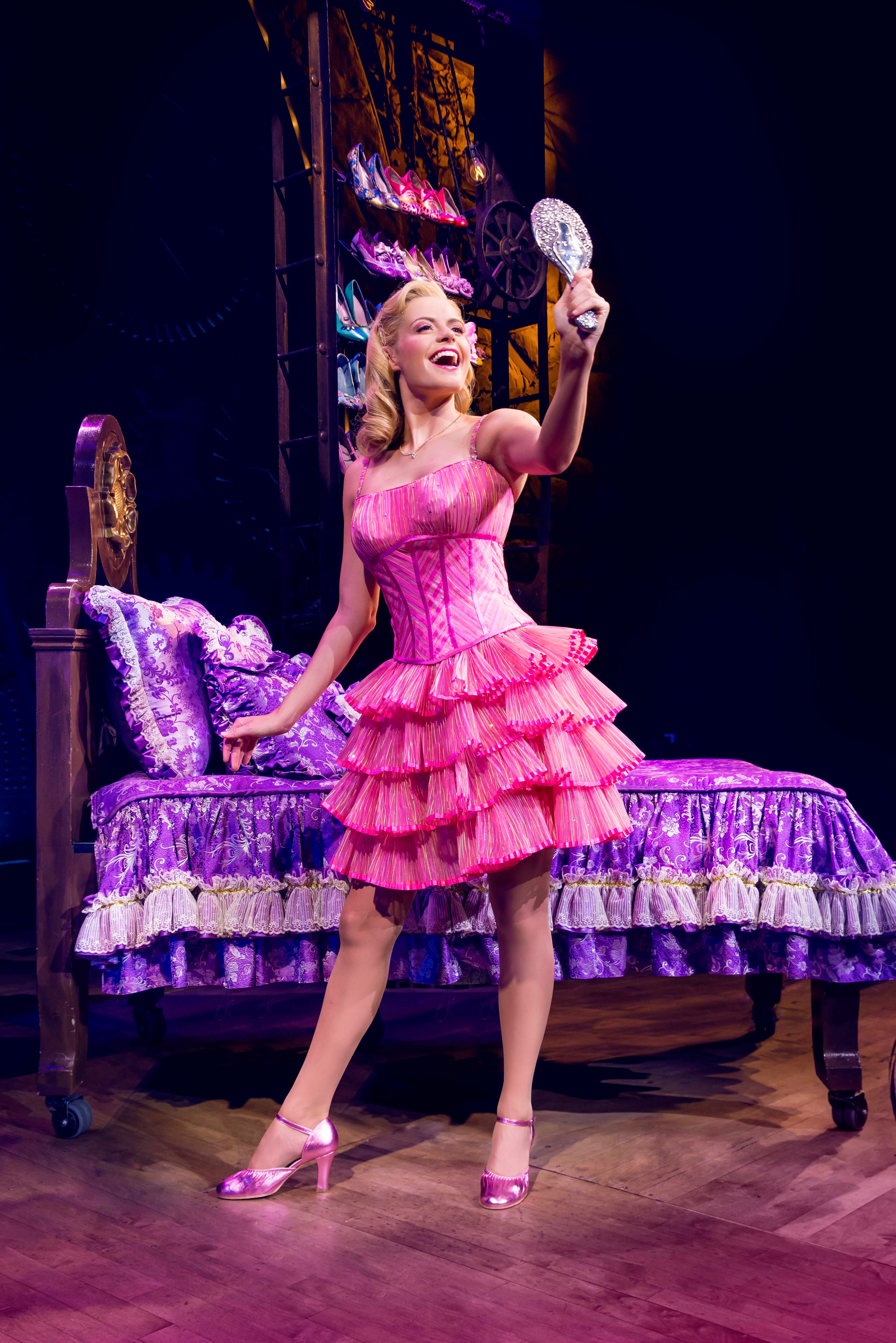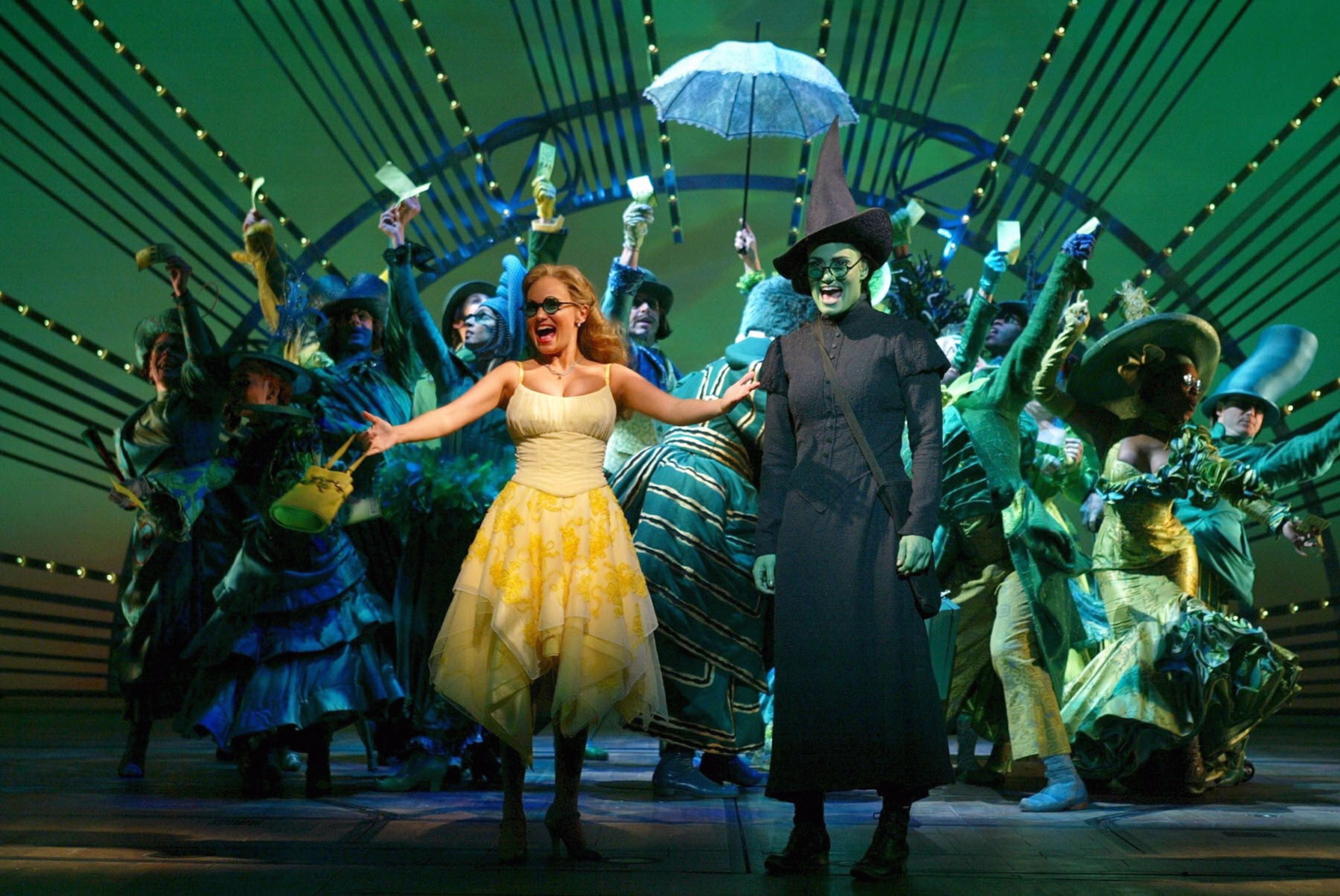‘Wicked was essentially a love story between two women’: How the once-mocked musical became a global sensation
The musical is making its triumphant return to the London stage after 18 months away. Alexandra Pollard sits down with its creators Stephen Schwartz and Winnie Holzman, and star Sophie Evans, to talk politics, popularity and ‘Defying Gravity’


It is Saturday 18 September 2021, and two young girls are arguing in the foyer of London’s Apollo Theatre. “I’m more exciteder than you,” says one, brandishing her programme for Wicked, the once-maligned, now-beloved musical based on The Wizard of Oz. “No, I am,” says the other. “I’ve been waiting for this for a year.” We all have.
It’s been 18 months, in fact, since the West End went dark, the coronavirus pandemic forcing every single show to shut down with immediate effect. So when Sophie Evans as Glinda floats down onto the stage for tonight’s performance of Wicked, a vision of sparkles and bubbles, to utter that hallowed opening line, “It’s good to see me, isn’t it?”, the whoops and cheers go on for at least a minute. It feels like magic.
“Theatre and performance struggled so much during the pandemic,” says Evans, who was the youngest person to ever take on the role of Glinda the Good Witch when she was first cast in 2017, at the age of 24. “Our industry’s really been knocked.” She didn’t get a single penny from the government while the theatres were shut, so she started doing singing lessons on Zoom to get by. “The fact we’re actually back now is kind of incredible. The audiences seem to be really there with you, because they know you’ve been out of work for such a long time.”
Wicked, which opened in the West End 15 years ago this week, is no stranger to setbacks. Take its Broadway debut in 2003. The spiky, allegorical origin story of the Wicked Witch of the West, it was met – to borrow a line from the musical itself – with “unadulterated loathing” from the critics. “Wicked does not, alas, speak hopefully for the future of the Broadway musical,” sniffed The New York Times. “A strenuous effort to be all things to all people tends to weigh down this lumbering, overstuffed $14m production,” scoffed Variety. New York Magazine decreed it “flat”, “heavy” and “boring”, while one critic from The New Yorker, who must surely have been in the bathroom when Idina Menzel belted out “Defying Gravity” and Kristen Chenoweth pranced and preened to “Popular”, concluded that “not one of the songs is memorable”. Eighteen years and over a billion dollars in ticket sales later, Wicked has had the last laugh. Or should I say, cackle.
“I think there was a misunderstanding of the intent of the show,” says composer and lyricist Stephen Schwartz, speaking to me over Zoom, his dog Wrigley beside him. In a few days’ time, he’s due to fly to London for the 15th-anniversary performance. “Critics saw the spectacle and the entertainment value, and therefore dismissed it as not having any strong dramatic or philosophical content. I think they’ve caught up with it now. Wicked has been around long enough that that misunderstanding has gone away.”
Based on the 1995 novel by Gregory Maguire, the musical centres on two witches: Elphaba, a prickly but principled witch who has been ostracised since birth because of her bright green skin, and Glinda, a pretty, blonde social climber who is forced to share a room with Elphaba at university. (Elphaba, by the way, is so named because it’s The Wizard of Oz author L Frank Baum’s initials said phonetically.) The two hate each other at first – “Every little trait, however small/ Makes my very flesh begin to crawl,” they spit at each other in “What Is This Feeling?” – but eventually become friends. Their final duet – it would be remiss to call it anything but a love song – is one of the musical’s finest moments: “Who can say if I’ve been changed for the better? But because I know you, I have been changed for good.” It has, by now, been sung at graduations and weddings the world over.
Before Wicked came along, female friendships in Broadway musicals had been few and far between. “There’d been a lot of romances up to that point, and a lot of stories about two guys, but there really had not been a story that captured the popular imagination where the two main roles were female,” says Schwartz. “When there were, they were always antagonistic. Wicked was essentially a love story between two women. And I think that just happened at a point where the culture was ready for it.”
The Oz of Wicked is not all rainbows and yellow brick roads, though – in fact, it is something closer to a totalitarian state, one in which talking animals are being stripping of their voice and forced into cages. When Elphaba, in her quest to fight for the rights of the oppressed, becomes increasingly radicalised, the Wizard and his sidekicks conspire to paint her as the villain. They are so successful that Elphaba’s eventual “death” – and you’ll know this if you’ve seen the Judy Garland film – is celebrated across Oz. “These people are totally brainwashed to believe that this person deserved to die,” says Evans, who has loved the musical since she was 14. “It’s really dark. They’re ready to spit on her grave.”
That Maguire originally considered writing a novel about Hitler, before pivoting to “the second most evil character in our collective American subconscious, the Wicked Witch of the West”, is indicative of how dark Wicked can go. Beneath the showtunes, the humour and the camp is a nuanced examination of good and evil, and an indictment of elitism, racism, fascism, scapegoating and the corrupting nature of power. Only occasionally do its analogies slip into heavy-handedness (the figure for scapegoating is a literal goat) – but this is a musical after all.

In a post-Trump world, Wicked’s heavier themes are still depressingly relevant. “I wish less so, to be honest,” says Schwartz with a sigh. “I wish it was becoming less politically and socially relevant.” He began writing the musical when Bill Clinton was president – “and so there were aspects of Bill Clinton in the Wizard character” – and finished it when George W Bush was in power. The Iraq war was at the forefront of his mind – particularly when he wrote lyrics like this from “Wonderful”: “Is one a crusader or ruthless invader? It’s all in which label is able to persist.”
“This war was sold completely on misinformation and disinformation, that was propagated not just by our government, but frankly by your government, too,” says Schwartz. “And also the demonisation of Saddam Hussein as a justification for the war. Not that he wasn’t a bad guy, but the total, black-and-white demonisation obviously struck us as part of the story. We hope that we threaded that in, in a subtle and entertaining way.” In 2016, Donald Trump came into power, “and unfortunately the whole idea of a post-truth world became crashingly true”.
After that, Winnie Holzman, who wrote the book (musical theatre lingo for the script), started getting texts from friends who’d been to see the show. “They would say to me: ‘What have you changed? You added so much. You made it so much more political,’” she recalls. “We didn’t change a thing. We didn’t rewrite a word. It was hitting people a different way.”
Holzman, who back in 2003 was best known for creating the TV series My So-Called Life, had only written one, unsuccessful musical when the opportunity to write Wicked came along. “I hate to say it, because I’m gonna sound like a walking cliche, but it really was kind of magical the way Wicked came into my life. This is not something I’ve said in interviews before, but I have a memory of saying to someone, ‘Gee, am I really never gonna write a musical again? I always thought I would do more than one, and I feel this yearning.’ About a month later, Stephen Schwartz came into my life.”
I knew automatically it was going to be a big thing in my life
The pair were brought together by a mutual friend, who invited them to lunch to discuss a possible Disney musical. “We started talking about this book called Wicked,” she recalls. “Stephen said, ‘Well it’s such a shame, because they’re planning a movie about it and it’s not a musical. I think it should be a Broadway musical.’ And then about six months later, he called me and he said, ‘Guess what? You should read the book because I think I’ve convinced them to let me make it into a Broadway musical.’ I had to sit down. I knew automatically it was going to be a big thing in my life.”
It was important to Schwartz, during the musical’s years-long creative process, that they not water down Maguire’s source material for the stage. “We never said, ‘Oh you know what? This is going to be too tough for an audience, we better soft pedal this aspect of it, lest it be too abrasive or challenging,’” he insists. To Holzman, too, the show’s political element has always been glaringly obvious. “We always knew the show was political,” she says. “A lot of the press that we got in the very beginning wasn’t picking up on that at all. Now, I don’t think you can watch the show and not pick up on it. I mean unless you’re five. But even then, they’re taking in something about social justice.”
There’s even a message to be taken from the biggest, brightest earworm of the bunch. In “Popular” – whose perky melody Schwartz based on bubblegum music, “though I tried to alter it rhythmically and harmonically” – Glinda takes it upon herself to teach Elphaba to be more likeable. “Celebrated heads of state, or especially great communicators,” she sings as she gamely attempts to teach her friend how to flirt and flounce, “Did they have brains or knowledge? Don’t make me laugh! They were popular! Please, it’s all about popular.”

“I mean, we clearly are living in a world where popularity is extremely important in what you can and can’t get away with,” says Schwartz when I mention that song. “But frankly, some of those lyrics are based on the presidency of Ronald Reagan. So it goes back to that and before.”
For Evans, that was one of the more nerve-wracking songs to take on when she landed the role of Glinda. Having spent a decade listening to Kristen Chenoweth’s version, she found it hard enough getting her head around doing it in an English accent. “I remember the first time I had a vocal lesson on it, he just stopped me after about two bars and said: ‘No, you’re doing it wrong,’” she says with a laugh. “And I was like, ‘What do you mean? I’m singing it exactly like Kristen Chenoweth.’ But she doesn’t sing it like it’s written. She did her own thing. So I had to unlearn everything and then re-learn it. I keep an element of her there because I think she played it amazingly, but I hope I do put my own little stamp on it.”
Schwartz wrote the role of Glinda specifically for Chenoweth. “She happens to have both a strong Broadway belt and an operatic soprano, which was a relatively unusual combination,” he says. “She asked me if there would be a way for her to utilise the soprano that she heretofore had never got to use on Broadway.” The frequent, glass-shattering high notes that every Glinda has had to replicate in the years since “came directly from a request from Kristen”. He thinks it changed an entire generation of aspiring musical theatre performers – Evans included. “When Sophie was growing up,” he says, “she probably thought, ‘If I want to do a role like this, I have to have both [styles of voice].’ So she developed and strengthened both, and now she can do that.”
Chenoweth, who is now one of the biggest stars on Broadway, came to see Evans’s Glinda before the pandemic hit. It was the first time she’d seen Wicked in full since she had been in it. “I was so nervous,” recalls Evans. “I could see her in the audience, this tiny little blonde woman. She literally is Glinda in real life. And she was just the nicest person ever. She wrote on my mirror in lipstick: ‘Sophie, you have my heart, Kristen.’ The cleaners cleaned it off. I was gutted.”

It was Elphaba, though, with whom Schwartz felt an immediate affinity when he and Holzman were writing Wicked. “She’s clearly an outsider who is wrestling with the desire to fit in, to gain love and acceptance,” he says, “and then has to weigh the costs of what compromises she might have to make in order to achieve this. And that’s a theme that, for whatever reason, resonates with me.”
This kinship led Schwartz to write what may well be his magnum opus: “Defying Gravity”. Closing out the first act, the big, shivers-inducing set piece sees a newly enraged Elphaba not only accept but embrace her outsider status. “I’m through accepting limits/ ‘Cause someone says they’re so,” she sings – well, belts. “Some things I cannot change/ But ’til I try, I’ll never know.”
It’s thanks to Idina Menzel – who originated the role of Elphaba both on Broadway and in the West End – that the song is one of the most challenging to sing in the history of musical theatre. “The thing I remember most was the day I taught her the song for the first time,” says Schwartz. “She came to my apartment in New York, and we went through the song, and she felt emotionally, what was happening at that point required the last verse to stay up higher. And so I altered the melody to allow her to do that. And I remember asking her, ‘If we do this, can you do it eight times a week? I know you could do it once for a record or a movie, but can you perform this eight times a week, week after week after week?’ And she was confident that she could.” She was right. “Now of course, maybe a hundred Elphabas have been required to do that.”
Schwartz is clearly proud of that song. “It felt good from the inside, if you know what I mean,” he says. “My assignment was to try to embody the moment when Elphaba comes into her full power. I’ve come to learn that if I can find my truth, and I can have the courage to expose myself enough to reveal my own emotions, that communicates. I didn’t, of course, have any anticipation of the effect that it would have beyond the show. I’ve heard from so many people over the years how that song has helped inspire them to find the courage to make changes in their own lives. That was never my intention, but it’s extremely gratifying.”
For the current West End production, it’s Laura Pick who takes on the challenge Menzel set all those years ago. The moment her Elphaba rises into the air – her enormous black cape spread across the width of the stage as she performs that final verse – is as good a reminder as any of why live theatre should be protected at all costs.
“You hear this roar in the theatre at the end of ‘Defying Gravity’ that is so thrilling,” says Schwartz. “And it doesn’t exist anywhere else except in live performance, where a group of theatre-goers, who become a community for that one performance, express themselves as one in that sound.” He smiles. “We’ve all missed that a lot. I certainly have.”
‘Wicked’ is on at London’s Victoria Apollo. Tickets are available until May 2022
Join our commenting forum
Join thought-provoking conversations, follow other Independent readers and see their replies
Comments


Bookmark popover
Removed from bookmarks